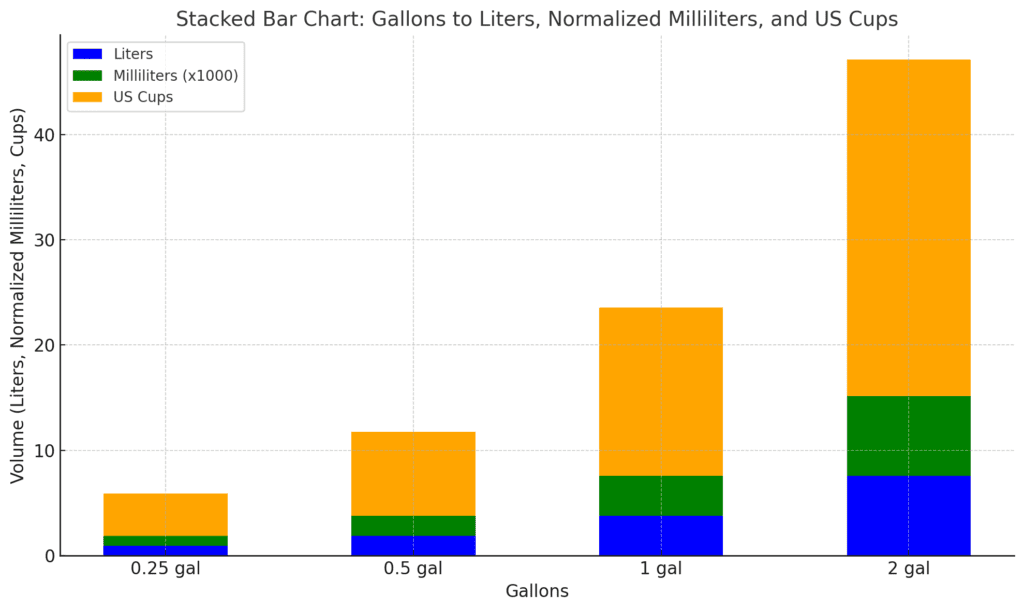Water hardness can significantly impact the flavor of your coffee. Hard water with excessive minerals can result in poor extraction, while softened water improves taste and protects your coffee maker. Our Coffee Water Softening Calculator helps you determine the exact amount of softener you need to achieve the ideal water hardness for brewing the perfect cup. Simply input your current water hardness, desired hardness, and water volume, and let the calculator do the rest!
Key Features:
Try the calculator below and take control of your coffee brewing!
This calculator uses both gallons and liters based on the selected country. Here’s a quick reference for converting between units:
| Gallons | Liters | Milliliters | Cups (US) |
|---|---|---|---|
| 0.25 gal | 0.946 L | 946 ml | 4 cups |
| 0.5 gal | 1.89 L | 1892 ml | 8 cups |
| 1 gal | 3.785 L | 3785 ml | 16 cups |
| 2 gal | 7.57 L | 7570 ml | 32 cups |
| 1 liter | 1 L | 1000 ml | 4.2 cups |
| 4 liters | 4 L | 4000 ml | 16.9 cups |
| 8 liters | 8 L | 8000 ml | 33.8 cups |
These are the typical volumes used in coffee brewing, as the Coffee Water Softening Calculator allows users to soften from 0.25 gallons to 2 gallons or from 1 liter to 8 liters.

To help users understand the conversions, we provide the following quick references:
Country Selection:
Current Water Hardness:
Desired Water Hardness:
Water Volume:
Choose Water Softening Method:
Calculation:
Results Display:
If a user in the USA selects:
The calculator will:
The Coffee Water Softening Calculator is a user-friendly tool that simplifies the process of adjusting water hardness for brewing coffee. By allowing users to input their current hardness, desired hardness, and water volume, the calculator computes the amount of softener needed and provides recommendations for coffee brewing based on softened water. This ensures the best extraction, flavor, and longevity for coffee equipment.
The best water hardness for coffee brewing falls between 60-85 mg/L or 3-5 GPG. This level ensures that enough minerals are present to enhance the flavor without causing bitterness. If your water is too hard or too soft, the taste of your coffee can be significantly impacted.
Hard water can lead to mineral deposits in your coffee maker, reducing its efficiency and affecting flavor extraction. Softening your water to an optimal level ensures a better tasting cup of coffee and extends the life of your brewing equipment.
To use the calculator, simply enter your current water hardness, select your desired hardness, and input the volume of water you’re using. The calculator will then tell you the precise amount of softener you need to adjust your water hardness for optimal coffee brewing.
You can measure your water hardness using a TDS (Total Dissolved Solids) meter or a water hardness test strip. These tools give an accurate reading in either GPG (grains per gallon) or mg/L (milligrams per liter), making it easy to input into the calculator.
No, distilled water lacks the essential minerals needed to enhance the flavor of coffee. It’s best to use water that has a moderate amount of hardness, as the minerals help with flavor extraction during brewing. Softened water within the recommended range is ideal.
The Coffee Water Softening Calculator supports:
Water hardness affects how your coffee tastes. If the water is too hard, it may lead to over-extraction, causing bitterness. On the other hand, if the water is too soft, your coffee might taste weak. Striking the right balance with softened water enhances flavor extraction, giving you a better cup of coffee.
If you don’t have a water softener, you can use filtered or bottled water that falls within the recommended hardness range. However, using a softener gives you more control over the exact water hardness level, ensuring consistent results in your brewing.
Yes, using softened water reduces the buildup of limescale and mineral deposits in your coffee machine. This not only improves the taste of your coffee but also prolongs the lifespan of your equipment by reducing the wear and tear caused by hard water.
Yes! The Coffee Water Softening Calculator is designed to accommodate both gallons (GPG) and liters (mg/L) depending on your location. It will automatically adjust the units based on the country you select.